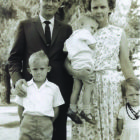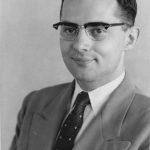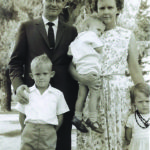
Feb 20, 2019
Victor Harold Burdick, M.D. (1927-2015)
“We are thanking you for the doctor whom you sent to us,” wrote J. Witness Mankhanamba. “It was a strange thing to see how he was doing with the people. He did not care how dirty they were, did not care how poor they were, but he showed his kindness by giving help to these poor people. Oh! God is Almighty, whom we thank. From Manjanja in Central Province up to the North, people were helped in the same way. He gave not only the medicine but also the spiritual message. Even now, he is giving to all of us from time to time this spiritual help.” The African pastor closed on another note, “We are looking forward, to the return of our nurses who went for furlough. They have done a great work here in Nyasaland….”
That was 1957. The thirty-year-old doctor, Victor Burdick, had been in Nyasaland (later Malawi) for just a few months after serving briefly as an Army medic in Japan near the end of World War II, then graduating from Alfred University and Albany Medical College in New York. The nurses, Joan Clement and Beth Severe, had served four years on the mission before that furlough. Within two years after the nurses returned, Victor and Beth were married in Africa.
In 1958 Seventh Day Baptist medical doctors in the USA received the first of a series of letters from Dr. Burdick, one year after he began work as medical director of SDB Makapwa Mission. He noted that he and the trained African “hospital assistant” saw about 25 new patients and 30 returning patients each day, he handling the problem cases or those requiring minor surgery. He and the three midwives delivered about 25 babies a month, he handling only the abnormal births. “I use a slide rule and 50-foot steel tape about as much or more than a stethoscope,” he reported. They were building a new home for the hospital assistant and one for the native midwives, with plans for building a hospital so that he would not need to make monthly trips to the nearest hospital taking several patients for major surgery. After listing gifts from American SDB physicians already in use (many catgut sutures, dental equipment, surgical instruments, a fine microscope, and the dispensary-maternity building), he promised to keep the doctors posted on how they could be helpful.
The Burdicks’ three children, Victor, Jr.; Joan; and Mark; were born during the thirteen years Victor worked on the mission. The schools and churches grew along with the medical work. Nyasaland became Malawi, independent from Great Britain. The Central Africa SDB Conference (CAC), now the largest in the SDB World Federation, was officially organized. Dr. Burdick’s 1969 report to the SDB Missionary Society, shortly before his departure, reflects the growth:
Our hospital continues to be the busiest department of Makapwa Station work, involving the largest staff and budget. Our medical assistant, Mr. Sankhulani, carries a heavy load, with long hours, but still maintains a cheerful disposition and evangelistic zeal. Although surgery has been gradually decreasing, the outpatient census and ward admissions continued in 1969 about the same as usual, and may be expected to continue without much decrease after the doctor leaves in 1970, thanks to Mr. Sankhulani’s efficiency and experience. With his three assistants he cares for an average of 96 outpatients per day and 4 male inpatients per day. Commonest diseases treated are malaria, bronchitis, dysentery, hookworm, and tropical ulcers. Female wards and the maternity
unit were handled capably by three nurse-midwives. Average number of women inpatients was 6 per day; maternity inpatients, 8 per day; deliveries, one per day. Well baby, and prenatal clinics were held weekly. Most of the record-keeping and dispensing of drugs and medical supplies was carried on by Beth Burdick, while general administration, consultation, and some surgery, was handled by Dr. Burdick. Thembe Dispensary was operated on a daily basis by one medical assistant, Mr. Mtengle, and one orderly,
Mr. Mbawa. Dr. Burdick made monthly supervisory visits. Average number of outpatients there: 40 per day.
In the Sabbath Recorder report on the Burdick’s departure from Malawi, CAC journalist Fedson F. Makatanje wrote:
The people of Malawi who loved the Burdicks, were very very sorry to lose the, because they had been so helpful. At the hospital, Dr. Burdick and his wife were attending serious patients quickly with a loving spirit. When a patient was to be taken down to the hospital by a car, Dr. Burdick was very willing to go over to help, no matter what time it was and how rough the road was, he had to go and get the patient to the hospital… As an evangelist, Dr. Burdick has visited almost every church in this country. Truly, he was not only a physical doctor, but he was also a spiritual doctor. In all the trips Dr. Burdick made, he identified himself with the people of the country by eating the African food … He drank the same water people used to drink, using the same cup. He slept with the people on the same mat made of reeds … Yes, his evangelism was unique. And truly many have come to Christ through his ministry… To prove that Dr. Burdick was greatly loved and needed by Malawi people, Chief Ngamwane in whose area Makapwa is built, with his Village headmen… and Malawi Congress Party area chairman… and ward councilor came to bid farewells… with them a wonderful and meaningful gift of two doves. “Now receive this small gift of doves which are so kind as you have been so kind, like the Spirit,” is a quotation from a letter Chief N Gamwane wrote to doctor. “When you arrive in America, remember us,” the letter concluded.
Dr. Burdick had expressed his mission philosophy in Sabbath Recorder articles with such titles as “Sharing the benefits of God’s redeeming love through the practice of medicine” and “Spiritual Surgery.”
Upon return to the USA in 1970, the Burdicks lived in South Pasadena, California, where Victor continued his work as a doctor in an OB/GYN residency for three years and then with Kaiser Permanente for 16 years; later in Colorado, and last in Arizona. Victor and Beth again became active in the Los Angeles SDB Church. Victor had moved his membership there and been
ordained a deacon in 1955 while extending his medical training at White Memorial Hospital before leaving for Africa in 1957. The Burdicks were active in the Pacific Coast Association and in organizing the San Gabriel Valley Church where they were charter members, holding a weekly Bible study in their home. Victor served on the conference Faith and Order Committee, directed Youth Pre-Con, and edited the SDB World Federation Week of Prayer booklet. For several years, he and Beth were a part of the NET (Natural Evangelism Training) team, traveling around the country to do training seminars in SDB churches.
In 2007 Dr. Burdick retired from medical practice and in 2015 he and Beth moved to Stephentown, NY, to live with their daughter Joan and her family. There they were active members in the Berlin, NY, SDB Church, Victor serving as deacon and prayer warrior.
Victor Harrold Burdick was born 7 August 1927 in Westerly, RI, the fifth of seven children of SDB Pastor Rev. Paul Burdick and Nancy (Brooks) Burdick. He grew up in the several churches his father pastored and served in others wherever he lived. He died 7 November 2015 at Berkshire Medical Center in Pittsfield, MA. He is survived by his wife of 56 years, Beth Severe Burdick; children, Victor Harold (wife Darcy) Burdick, Jr. of Highlands Ranch, CO; Joan Marie Burdick (husband Jeff) Brokalis of Stephentown, NY; and Mark Daniel (wife Deborah) Burdick of Phoenix, AZ.; seven grandchildren; siblings, Stan (Cathie) Burdick, Bob (Mary) Burdick, and LeRoy (late Ruth) Burdick, and Marion (Dick) Maxson.
A memorial service was held 14 November 2015 at
the Berlin, NY, SDB Church with Rev. Matthew Olson
officiating.
Sources for this article by Janet Thorngate are Dr. Burdick’s obituary and articles in the Sabbath Recorder between 1954 and 1986. Major quotations are from the following, in respective order: Mankhanamba, SR 163:13, Oct 7, 1957, p. 7-9; Burdick, SR 164:4, Jan. 27, 1958, p. 6; Burdick, SR 188:9, March 2, 1970, p. 12-13; Makatanje, SR 188:24, June 15, 1970, p. 10-11.



